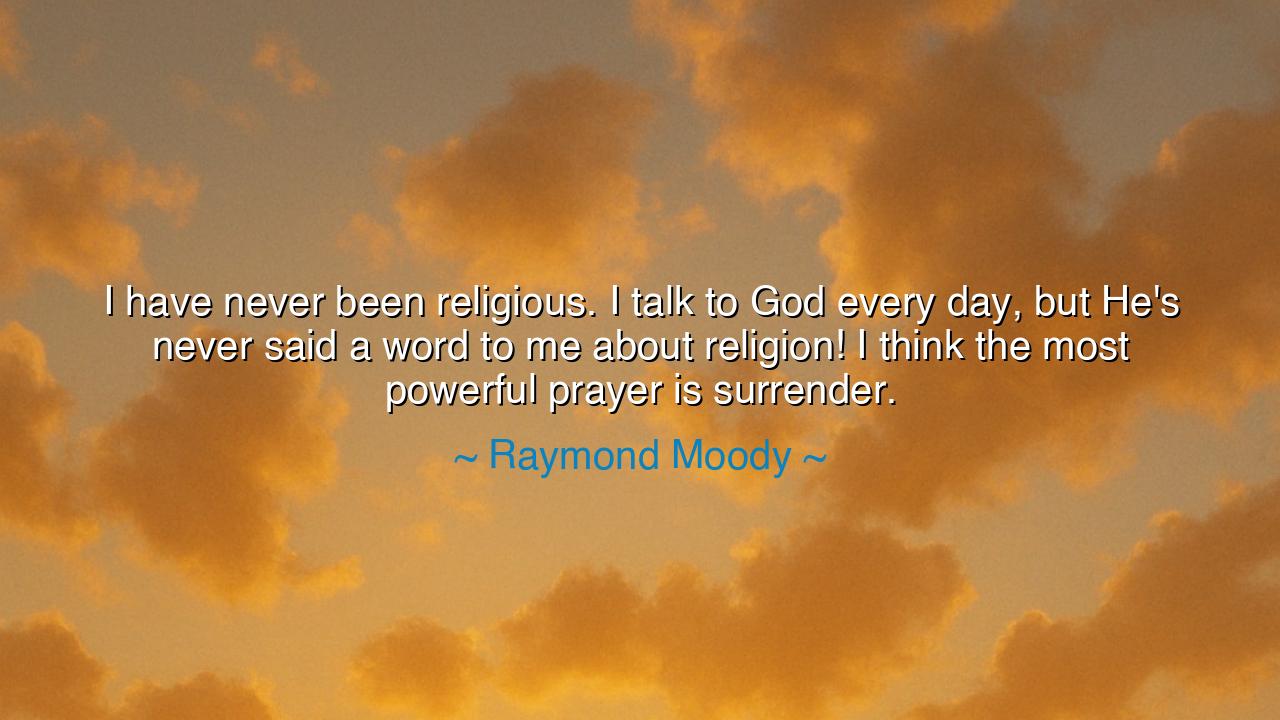
I have never been religious. I talk to God every day, but He's
I have never been religious. I talk to God every day, but He's never said a word to me about religion! I think the most powerful prayer is surrender.






"I have never been religious. I talk to God every day, but He's never said a word to me about religion! I think the most powerful prayer is surrender." These words from Raymond Moody, renowned for his work in near-death studies, touch upon the deep tension between spirituality and religion. Moody's statement reveals a profound understanding of faith, one that transcends the boundaries of institutional beliefs. He suggests that religion, with all its dogma and ritual, may not be the true means by which we connect with the divine. Instead, it is through surrender, an act of opening ourselves fully to the universe, that we encounter the true nature of the divine. This understanding elevates prayer to something more intimate and personal, where the focus is not on prescribed rituals but on the surrendering of the self to a higher force.
The origin of Moody's sentiment can be traced to ancient traditions that often viewed religion as a structured approach to spirituality, yet emphasized the importance of personal connection with the divine. The Greeks, particularly the mystics and philosophers, often spoke of the need for direct experience with the divine, rather than relying solely on formalized beliefs or rituals. Socrates, for example, did not see his relationship with the divine as one defined by the rules of the state or temple. Rather, it was personal, rooted in his own reflections and inward dialogue with the divine — a dialogue not bound by organized religion, but by a quest for truth and wisdom. Like Socrates, Moody emphasizes that true spirituality transcends formal religion, inviting us to connect with the divine on a more personal and intimate level.
Consider the story of Rumi, the great Sufi mystic. Rumi’s spirituality was deeply personal, and he rejected the conventional religious practices of his time in favor of an intense, direct experience of the divine. His poetry speaks of surrendering to love, which he saw as the divine force that connects all of existence. In his famous line, “Let yourself be silently drawn by the strange pull of what you really love. It will not lead you astray,” Rumi captures the essence of surrender: the willingness to open oneself completely to the divine flow, without the need for religious constructs. Rumi’s spirituality was not bound by religion in the conventional sense, but instead was rooted in a deep and personal connection to God, much like the one Moody speaks of in his own life.
This idea of surrender as the most powerful form of prayer is found in the Buddhist concept of letting go. In Zen Buddhism, the practice of surrender is central to enlightenment. Bodhidharma, the Indian monk who brought Zen Buddhism to China, emphasized that true wisdom comes not from clinging to concepts or dogmas, but from a deep surrender to the present moment and the acceptance of things as they are. This echoes Moody’s belief that the most profound connection to the divine is not about structured prayer or rituals, but about releasing control and embracing the natural flow of life. It is through surrender — allowing ourselves to be guided by forces greater than our own understanding — that we find true peace and clarity.
Surrender is also a theme in the life of Nelson Mandela, who spent 27 years in prison fighting against apartheid. Mandela’s personal journey was one of deep inner conflict, where he had to reconcile his fierce desire for justice with the reality of his own suffering and imprisonment. Despite the hardships he faced, Mandela came to understand that true freedom and peace came not from forceful resistance alone, but from a surrender to the larger forces of love and reconciliation. His willingness to forgive, to surrender his personal bitterness and desires for revenge, played a crucial role in his ability to lead South Africa out of apartheid and into a new era of peace. Mandela’s story exemplifies the power of surrender — the willingness to let go of one’s ego and align with a higher purpose for the greater good.
The lesson Moody imparts, drawing from both ancient wisdom and modern experience, is that true spirituality is not found in religious structures or rituals alone. It is found in the personal connection we develop with the divine, which often requires surrender — letting go of our need to control, our need for rigid belief systems, and our attachment to outcomes. Surrender does not mean submission in a passive sense, but rather an active choice to align ourselves with the flow of the universe, to trust in the wisdom that comes from beyond the self. It is through this surrender that we find our true path and purpose.
To integrate this wisdom into our lives, we must cultivate practices that allow us to surrender — to release our need for control and embrace the unknown. This may mean meditation, where we sit in stillness and allow our thoughts to pass without attachment. It may also involve mindful action in our daily lives, letting go of the outcomes and focusing on the process of living fully in the present. Like Rumi, Socrates, and Mandela, we must learn to trust the divine flow of life, accepting that we are part of a larger whole. In this surrender, we find true connection, peace, and, ultimately, our deepest sense of self.






AAdministratorAdministrator
Welcome, honored guests. Please leave a comment, we will respond soon